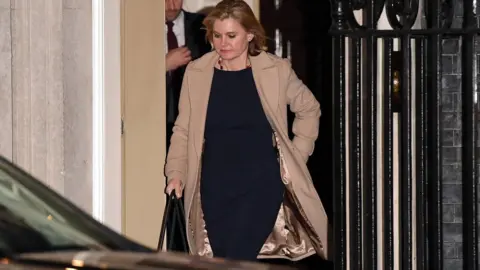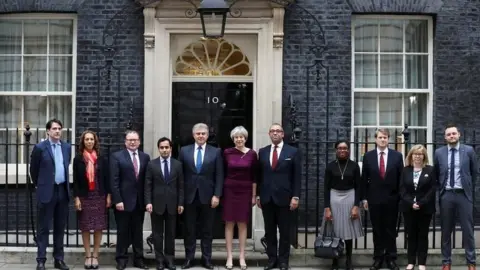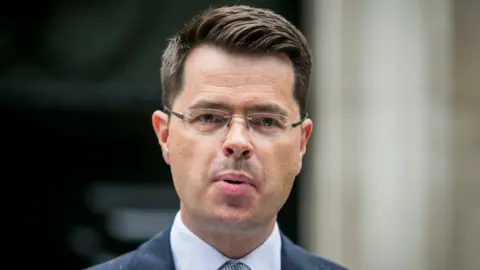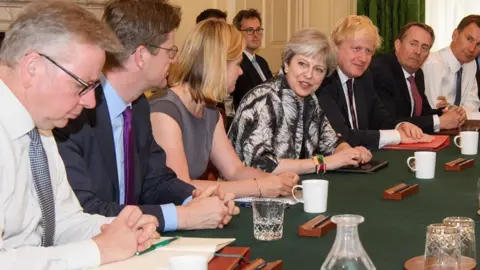Cabinet reshuffle: Justine Greening resigns from government
 Getty Images
Getty ImagesJustine Greening has resigned from the government after refusing a job as work and pensions secretary in Theresa May's cabinet reshuffle.
BBC political editor Laura Kuenssberg said the PM was "disappointed" the ex-education secretary had quit.
She has been replaced by Damian Hinds, while Esther McVey has been promoted to be the new work and pensions secretary.
Brandon Lewis is Tory chairman, Matt Hancock is culture secretary and Karen Bradley is Northern Ireland secretary.
She replaces James Brokenshire, who resigned for health reasons.
The reshuffle continues with junior ministerial roles on Tuesday.
Ms Greening's resignation comes less than a month after she launched the government's social mobility strategy.
In her resignation statement she said: "Social mobility matters to me and our country more than a ministerial career.
"I'll continue to work outside of government to do everything I can to create a country for the first time that has equality of opportunity for young people wherever they are growing up."
In Mrs May's reshuffle, Mr Lewis, the immigration minister, replaces Sir Patrick McLoughlin as Conservative Party chairman, with James Cleverly as his deputy.
Justice Secretary David Lidington has been moved to the Cabinet Office.
Mr Lidington, who will deputise for Mrs May at PMQs, is succeeded by David Gauke - who is switching from work and pensions, where his responsibilities included the roll-out of universal credit.
Mr Lewis, the Great Yarmouth MP, has been a minister since 2012 and is a qualified barrister and former local councillor.
In his role as chairman he will be tasked with broadening the Conservatives' appeal after they lost their Commons majority in June's general election.
He will be assisted by Mr Cleverly, the pro-Brexit backbench MP for Braintree, and a new line-up of vice chairs with responsibility for different areas has also been announced.
The replacement for Mr Brokenshire, who is awaiting surgery for a lung condition, will be at the heart of attempts to end the political deadlock at Stormont.

 PA
PAHome Secretary Amber Rudd, Chancellor Philip Hammond, Brexit Secretary David Davis and Foreign Secretary Boris Johnson are staying in their jobs.
Jeremy Hunt, who had been touted for a possible move, remains in his job, which has been renamed secretary of state for health and social care.
Also not moving is Communities Secretary Sajid Javid, but the word "housing" has been added to the title of his department.
Labour said Mrs May should focus on the pressures in the NHS rather than what it said was a "desperate PR exercise".
Veteran Conservative MP Sir Nicholas Soames did not seem impressed:
Allow X content?
Grant Shapps, Conservative party chairman between 2012 and 2015, said the reshuffle had not been "brilliantly executed" but praised plans for housing and health.
"There was some good stuff, strangely buried in a reshuffle that didn't quite go to plan," he told BBC Two's Newsnight.
He said the addition of housing to the title of the communities department would give "a lot more focus" to government plans to build more homes - adding that plans to bring health and social care together were "quite smart".
But Labour leader Jeremy Corbyn said: "The government's big plan for the new year is to dodge the real issues and reshuffle the pack in a pointless and lacklustre PR exercise.
"It's simply not good enough. You can't make up for nearly eight years of failure by changing the name of a department."

Was May foiled in reshuffle aims?
Laura Kuenssberg, BBC political editor
 PA
PATheresa May had mulled over her reshuffle for months.
On Monday she felt daring enough to do it, after ending the tumult of 2017 with the government in better shape than for quite some time, despite the embarrassing departures of some of her colleagues.
The task was not to make radical changes, the most senior jobs were never in question, but the plan was to get the right reformers into the right jobs in her view, and to plan for the future.
The question of the long term will still be dealt with on Tuesday, when junior ministers are expected to be appointed, with far greater numbers of women and ethnic minority MPs, part of the Tories' effort to look more like the country they govern.

The changes, which will be Mrs May's third reshuffle since becoming PM in July 2016, were triggered by her sacking of Damian Green last month as first secretary of state.
Mr Green was fired from his position, a role in which he was effectively Mrs May's deputy, after making "misleading statements" to the press about pornography found on his office computer in 2008.
Mr Lidington has replaced Mr Green in the Cabinet Office but has not been made first secretary.
Downing Street confirmed he would stand in at Prime Minister's Questions and take over a "significant" number of the committees that Mr Green chaired.
Andrea Leadsom remains as Leader of the Commons, and Liz Truss will continue her role as chief secretary to the Treasury.

Social care and health - by Hugh Pym, BBC health editor
There have been increasing calls for an integration of health and social care in England - the two areas are already combined in Northern Ireland and Scotland.
Cuts in social care funding in England have been blamed by some as a factor in the pressures on the NHS - with delays discharging medically fit patients from hospital caused by problems finding social care provision.
The Department of Health already has responsibility for social care - but it is run by local authorities, partly paid for by council tax, and the central Whitehall grant comes through the Department for Communities and Local Government.
It is not clear whether that grant will now move across to the rebranded Department of Health and Social Care. A Government policy paper on social care, known as a Green Paper, is due next summer - and it seems likely that Jeremy Hunt will now play a central role in preparing that document, rather than it staying with the cabinet office.

